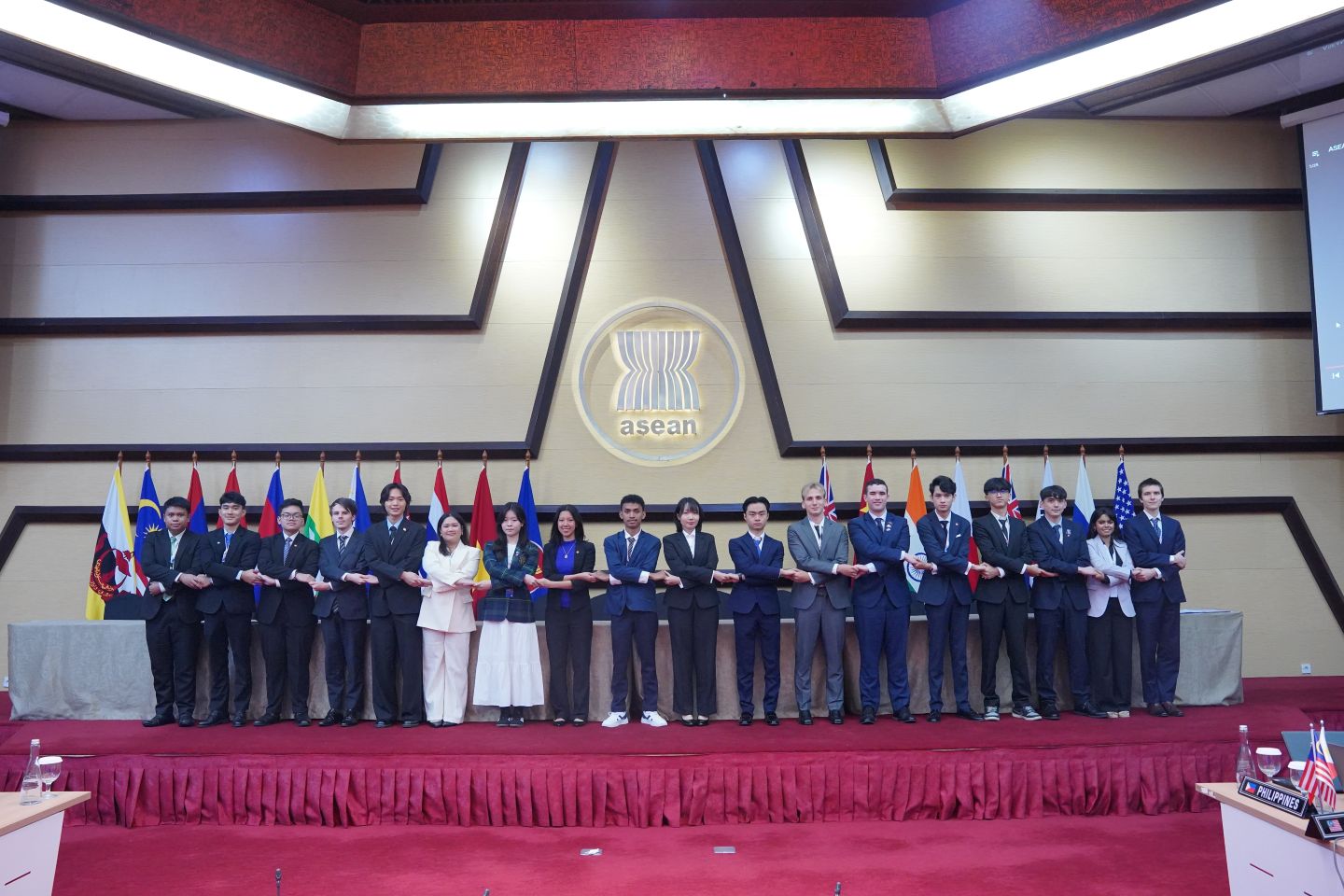Jakarta, Indonesia | 15–19 September 2025 – Young leaders from the ten ASEAN Member States, Timor-Leste, and East Asia Summit (EAS) countries including Australia, China, India, Japan, New Zealand, the Republic of Korea, the Russian Federation, and the United States, are gathering in Jakarta this week to participate in the ASEAN Foundation Model ASEAN Meeting East Asia Summit 2025 (AFMAM EAS 2025). The programme runs from 15–19 September 2025 at the ASEAN Secretariat/ASEAN Headquarters.
This year’s AFMAM takes on a special format to commemorate the 20th anniversary of the East Asia Summit (EAS) – a leaders-led forum for dialogue on strategic, political, and economic issues aimed at promoting peace, stability, and prosperity in the region. Unlike previous editions, the AFMAM EAS 2025 brings together both ASEAN and East Asia participants, offering delegates the chance not only to understand the complexities of ASEAN diplomacy but also to explore how it connects with real regional challenges and diverse perspectives.
A total of 60 outstanding young leaders are taking the roles of senior ASEAN officials and Dialogue Partner representatives, engaging in high-level simulations of ASEAN meetings and a Model East Asia Summit. To mark this milestone, the ASEAN Foundation, in collaboration with the Missions of Australia, China, and Japan to ASEAN, and with the support of the Japan-ASEAN Integration Fund (JAIF) and the ASEAN-China Cooperation Fund (ACCF), is proud to present this special edition of its flagship diplomacy initiative.
The main focus of AFMAM EAS 2025 is to encourage youth participation in regional diplomacy by discussing cross-sectoral challenges that affect both ASEAN Member States and the wider East Asia region. Thematic discussions will cover offshore renewable energy, disaster management, and marine litter and pollution — issues that reflect ASEAN’s strategic priorities under its three pillars: Political-Security, Economic, and Socio-Cultural. The programme also highlights opportunities for stronger regional cooperation.
Before arriving in Jakarta, delegates took part in Pre-Conference Online Training to build their foundational knowledge of ASEAN, the East Asia Summit, the ASEAN Outlook on the Indo-Pacific (AOIP), the ASEAN Community Vision 2045, and the key thematic areas. They were also introduced to foreign policy, diplomacy, and simulation procedures. During the In-Conference Training, participants will attend workshops and informal consultations to prepare for the simulations, focusing on the role and function of the ASEAN Secretariat and the EAS Chair, the protocols for chairing and facilitating ASEAN and EAS meetings, and the techniques for developing, negotiating, and amending outcome documents.
H.E. Amb. Sitsangkhom Sisaketh, Permanent Representative of Lao PDR to ASEAN, highlighted the significance of the programme in his opening remarks: “This year’s AFMAM is unlike any before, bringing together delegates from 19 countries – the ten ASEAN Member States, Timor-Leste, and our East Asia Summit partners. This makes AFMAM a truly global classroom, one that mirrors the real world of diplomacy where decisions are rarely made by one nation alone, but through dialogue among many. In today’s fast-changing landscape, where technology, climate change, and global security are constantly reshaping our world, initiatives like this matter more than ever. You are not just simulating diplomacy; you are rehearsing for the future of international cooperation.”
The ASEAN Foundation highlighted that this youth-driven initiative is not only about celebrating history but also about shaping the future. Dr. Piti Srisangnam, Executive Director of the ASEAN Foundation, explained: “Through AFMAM EAS 2025, we are celebrating 20 years of the East Asia Summit while preparing young people to become the leaders of tomorrow. They gain practical insight into diplomacy, sharpen their negotiation skills, and build lasting cross-border networks.”
In addition to ASEAN’s perspective, Dialogue Partners also reaffirmed their commitment to youth engagement. H.E. Ambassador Kiya Masahiko expressed pride in supporting the initiative, noting: “Japan is greatly honoured to support the 2025 Model East Asia Summit and to welcome talented and aspiring delegates from all EAS Participating Countries. We hope that this initiative will strengthen and expand the network of young leaders across ASEAN and the Indo-Pacific for our shared future”!
This view was echoed by Australia H.E. Ambassador McDonald emphasised that the collaboration reflects a long-term investment in the next generation: “Australia is pleased to co-sponsor the 2025 Model East Asia Summit with Japan and China as the EAS celebrates its 20th anniversary. This initiative is empowering the next generation to develop the skills, understanding and friendships that will carry forward the next twenty years and beyond of the East Asia Summit, as the region’s premier forum for strategic dialogue.”
Adding to this, Mr. Fu Fengshan, Chargé d’Affaires a.i. of the Mission of the People’s Republic of China to ASEAN, highlighted that the event goes beyond a youth exchange: “AFMAM EAS 2025 is more than just a youth exchange programme. It is an opportunity for investment and empowerment in the young talents as future leaders. The event has shown our strong commitment to enhancing multilateralism and dynamic cooperation for the well-being of the Asia-Pacific region.”
The programme also features a spirited Cultural Night, where delegates will showcase traditional performances and host cultural booths displaying souvenirs from their respective countries, providing a rich opportunity to experience the diversity of the region. The Closing Ceremony will mark the end of the event with an awards presentation recognising outstanding delegates for their dedication, creativity, and leadership throughout the programme. As the highlight of the programme, a full-scale East Asia Summit simulation will see delegates deliberate on regional issues and collectively draft a youth-driven Outcome Document, modelled on a Leaders’ Statement. This document will capture their perspectives and policy proposals and will be formally signed at the conclusion of the summit.

